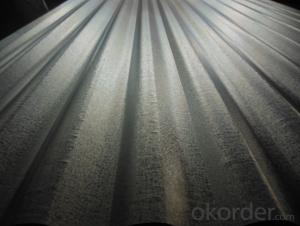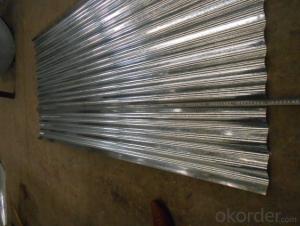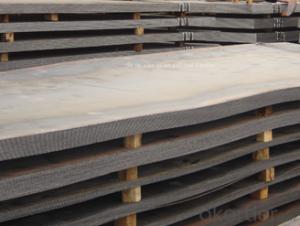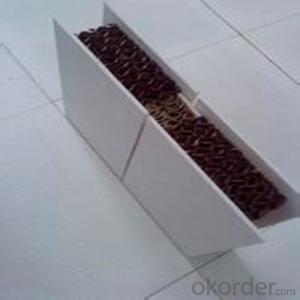Aluzinc Corrugated Steel Sheet
- Loading Port:
- China Main Port
- Payment Terms:
- TT OR LC
- Min Order Qty:
- -
- Supply Capability:
- -
OKorder Service Pledge
OKorder Financial Service
You Might Also Like
Aluzinc Steel AFP Details:
| Minimum Order Quantity: | 25mt | Unit: | m.t. | Loading Port: | China Main Port |
| Supply Ability: | 50000 Metric Tons per Month | Payment Terms: | T/T or L/C |
Product Description:
General Information
Thickness: 0.25mm-4.0mm |
Width: 900mm-1250mm |
Alu-zinc Coating: 50-150g/m2 |
Internal Diameter: 508mm/610mm |
Coil Weight: 4-8MT |
Quality: commercial and structural quality |
Surface Treatment: oiled & dry, chromated, anti-finger, non-skin pass/ skin pass |
Standard: JIS G 3321, ASTM A792M, EN 10215 |
Steel Grade: SGCC, SGCD, CS,FS,SS,DX51D+Z DX52D+Z; S200GD, S220GD, S280GD, S350GD |
Package: full wrapped with anti-damped paper inside, iron sheet wrapped outside, and bundled by iron strips |
Technical Data
Chemical Composition | C | Si | Mn | P | S |
0.04-0.06% | 0.01-0.03% | 0.18-0.22% | 0.014-0.016% | 0.006%-0.009% |
Technical Data | |
Yield Strength | (Mpa) 280-320 |
Tensile Strength | (Mpa) 340-390 |
Elongation | 20%-30% |
Out-of-square | not exceed 1% Flatness |
Bow | 15mmmax |
Edge Wave | 9mmmax |
Centre Buckle | 8mmmax |
Bending At 180 Degree | no crack, peeling and fraction |
Application
Aluzinc Steel can be widely used in transportation, light industry, civil usage and farming. It is also the perfect building material in construction for making roofing tile, steel profiles for wall partition, T-bar, studs, fireproof door, air conditioning duct and home appliance.
- Q:What are the advantages of using galvanized steel sheets?
- There are several advantages of using galvanized steel sheets. Firstly, galvanized steel sheets have a protective zinc coating that helps prevent rust and corrosion, making them highly durable and long-lasting. Secondly, they are resistant to extreme weather conditions, including rain, snow, and sunlight, which makes them suitable for outdoor applications. Additionally, galvanized steel sheets are versatile and can be easily formed into different shapes and sizes, making them ideal for various construction and manufacturing projects. Lastly, galvanized steel sheets are cost-effective as they require minimal maintenance and repair, reducing overall expenses in the long run.
- Q:What are the applications of steel sheets in construction?
- Steel sheets are widely used in construction for applications like roofing, flooring, wall cladding, and structural components due to their durability, strength, and versatility. They provide a reliable and long-lasting solution for various construction needs, ensuring stability, fire resistance, and protection against harsh weather conditions. Additionally, steel sheets can be easily customized, allowing for flexibility in design and construction processes.
- Q:Can steel sheets be used for walkways or platforms?
- Yes, steel sheets can be used for walkways or platforms. Steel sheets are commonly used in industrial and commercial settings due to their durability, strength, and resistance to various environmental factors. They can be fabricated and installed to create sturdy walkways or platforms that can withstand heavy foot traffic or even the movement of equipment and machinery. Steel sheets can also be customized to meet specific design requirements such as non-slip surfaces, raised edges for safety, or perforations for drainage. Additionally, steel sheets are relatively low maintenance and can be easily cleaned and maintained, making them an ideal choice for walkways or platforms in various applications including factories, warehouses, construction sites, and even outdoor areas.
- Q:What are the different types of surface treatments available for steel sheets?
- There are several different types of surface treatments available for steel sheets, each serving a specific purpose and offering unique benefits. 1. Hot-dip galvanizing: This is a widely used method where steel sheets are dipped in a bath of molten zinc, creating a protective coating that prevents corrosion. Hot-dip galvanizing provides excellent corrosion resistance and durability. 2. Electro-galvanizing: In this process, a layer of zinc is electrochemically deposited onto the steel sheets, creating a thin, uniform coating. Electro-galvanizing provides good corrosion protection and is often used for decorative purposes. 3. Powder coating: This surface treatment involves applying a dry powder onto the steel sheets and then curing it using heat. Powder coating provides a durable and attractive finish, offering protection against corrosion, UV rays, and chemicals. 4. Paint coating: Steel sheets can be coated with various types of paints, including epoxy, polyurethane, and polyester. Paint coatings provide aesthetic appeal and offer protection against corrosion and weathering. 5. Phosphating: This treatment involves applying a phosphate coating to the steel sheets, which enhances their corrosion resistance and improves paint adhesion. Phosphating is often used as a pre-treatment before painting or powder coating. 6. Chromate conversion coating: Also known as chromating or passivation, this treatment involves applying a thin layer of chromate onto the steel sheets. Chromate conversion coatings enhance corrosion resistance and improve paint adhesion. 7. Anodizing: Although primarily used for aluminum, anodizing can also be applied to steel sheets. This process involves creating an oxide layer on the surface of the steel, which enhances corrosion resistance and provides a decorative finish. 8. Pickling: This treatment involves immersing the steel sheets in an acidic solution to remove scale, rust, and other impurities. Pickling leaves the steel sheets with a clean, smooth surface, ready for subsequent treatments or processes. Overall, the choice of surface treatment for steel sheets depends on the intended application, desired appearance, and level of corrosion resistance required.
- Q:Can steel sheets be used for cladding or facade systems?
- Yes, steel sheets can be used for cladding or facade systems. Steel sheets offer durability, strength, and versatility, making them suitable for various architectural applications. They can be used to create visually appealing and modern facades while providing protection against weather elements and enhancing energy efficiency.
- Q:Can steel sheets be used for walkways and platforms?
- Yes, steel sheets can be used for walkways and platforms. Steel sheets are durable, strong, and capable of supporting heavy loads, making them suitable for such applications. Additionally, they can be fabricated and designed to meet specific requirements, ensuring safety and stability for users.
- Q:How do steel sheets handle chemical exposure?
- Steel sheets are renowned for their outstanding ability to resist chemical exposure. They exhibit a high level of resistance to corrosion and can endure exposure to a wide array of chemicals, including acids, alkalis, solvents, and other substances that cause corrosion. This exceptional resistance is primarily attributed to the formation of a protective oxide layer, known as patina, on the surface of the steel. This layer acts as a barrier, preventing the chemicals from attacking the steel. Moreover, steel sheets can be further safeguarded by applying various protective coatings, such as galvanization, epoxy coatings, or powder coatings. These coatings provide an extra layer of protection and enhance the steel's resistance to chemical exposure. However, it is important to acknowledge that the resistance of steel sheets to chemical exposure may vary based on the specific type and concentration of the chemicals involved. Highly concentrated or aggressive chemicals may still lead to some degree of corrosion or damage to the steel surface over time. Hence, it is crucial to carefully consider the specific chemical environment and select the appropriate grade of steel and protective coating to ensure optimum resistance to chemical exposure. In summary, steel sheets are a dependable and durable choice for applications that demand resistance to chemical exposure. With careful selection and maintenance, they can effectively withstand diverse chemical environments and deliver long-lasting performance.
- Q:What are the different coating options available for steel sheets?
- There are several coating options available for steel sheets, each offering unique benefits and protection against various environmental factors. Some of the most common coating options include: 1. Galvanized Coating: This is the most widely used coating for steel sheets. It involves applying a layer of zinc to the surface, which acts as a sacrificial anode and prevents corrosion. Galvanized coating provides excellent corrosion resistance and is suitable for both indoor and outdoor applications. 2. Galvannealed Coating: This coating is similar to galvanized coating but is further heat-treated to form a zinc-iron alloy layer on the surface. Galvannealed coating offers improved paint adhesion and weldability, making it suitable for applications that require painting or additional fabrication processes. 3. Electroplated Coating: This process involves immersing the steel sheet in a solution containing metal ions and applying an electric current to deposit a thin layer of metal onto the surface. Common electroplated coatings include zinc, nickel, and chromium. Electroplated coatings provide enhanced corrosion resistance and can also improve aesthetics. 4. Organic Coating: Also known as painted or coated steel sheets, this option involves applying a layer of organic material such as paint, powder coating, or plastic film to the steel surface. Organic coatings provide protection against corrosion, UV radiation, and abrasion. They also offer a wide range of colors and finishes, making them suitable for architectural and decorative applications. 5. Tin Coating: Tin-plated steel sheets have a thin layer of tin applied to the surface through an electroplating process. Tin coating provides excellent solderability, corrosion resistance, and food-grade suitability. It is commonly used in the production of food cans and other packaging materials. 6. Aluminized Coating: This coating involves applying a layer of aluminum to the steel surface through a hot-dipping process. Aluminized coating provides excellent heat reflectivity, corrosion resistance, and thermal conductivity. It is often used in applications that require heat resistance, such as exhaust systems and heat exchangers. These are just a few of the many coating options available for steel sheets. The choice of coating depends on factors such as the intended use, environmental conditions, and desired properties of the steel sheet. It is essential to consider these factors and consult with coating experts to determine the most suitable option for specific applications.
- Q:What is the maximum temperature that steel sheets can withstand?
- The maximum temperature that steel sheets can withstand depends on the grade and type of steel. Generally, most steel alloys can withstand temperatures up to around 1,300 to 1,500 degrees Fahrenheit (700 to 800 degrees Celsius) before the material starts to weaken and lose its structural integrity. However, specialized high-temperature steels can withstand even higher temperatures, reaching up to 2,300 degrees Fahrenheit (1,260 degrees Celsius).
- Q:What are the weight and load-bearing capacities of steel sheets?
- The weight and load-bearing capacities of steel sheets can vary depending on factors such as the thickness, grade, and type of steel being used. Generally, steel sheets have high strength and can withstand heavy loads. However, it is essential to consult the specific specifications and guidelines provided by the manufacturer or engineering standards for accurate information on weight and load-bearing capacities.
1. Manufacturer Overview |
|
|---|---|
| Location | |
| Year Established | |
| Annual Output Value | |
| Main Markets | |
| Company Certifications | |
2. Manufacturer Certificates |
|
|---|---|
| a) Certification Name | |
| Range | |
| Reference | |
| Validity Period | |
3. Manufacturer Capability |
|
|---|---|
| a)Trade Capacity | |
| Nearest Port | |
| Export Percentage | |
| No.of Employees in Trade Department | |
| Language Spoken: | |
| b)Factory Information | |
| Factory Size: | |
| No. of Production Lines | |
| Contract Manufacturing | |
| Product Price Range | |
Send your message to us
Aluzinc Corrugated Steel Sheet
- Loading Port:
- China Main Port
- Payment Terms:
- TT OR LC
- Min Order Qty:
- -
- Supply Capability:
- -
OKorder Service Pledge
OKorder Financial Service
Similar products
New products
Hot products
Related keywords






























